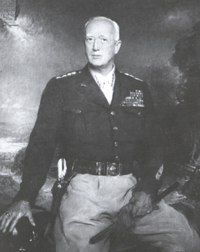| ~ Hall of Heroes ~ Famous quotes of
Gen. George S. Patton |
     |
|

|
| "A good plan, violently executed now, is better than a perfect plan next week."
“A good solution applied with vigor now is better than a perfect solution applied ten minutes later.”
"America loves a winner, and will not tolerate a loser, this is why America has never, and will never, lose a war.”
“A pint of sweat will save a gallon of blood.”
“By perseverance, study, and eternal desire, any man can become great.”
“Do everything you ask of those you command.”
“Do more than is required of you.”
“Fixed fortifications are monuments to man's stupidity.”
“Good tactics can save even the worst strategy. Bad tactics will destroy even the best strategy.”
“I always believe in being prepared, even when I'm dressed in white tie and tails.”
“I am a soldier, I fight where I am told, and I win where I fight.”
“If everybody is thinking alike, then somebody isn't thinking.”
“If I do my full duty, the rest will take care of itself.”
“In case of doubt, attack.”
“It’s the unconquerable soul of man, not the nature of the weapon he uses, that insures victory.”
“Lead me, follow me, or get out of my way. ”
“Live for something rather than die for nothing.”
"May God have mercy upon my enemies, because I won't.”
“Moral courage is the most valuable and usually the most absent characteristic in men.”
“Never let the enemy pick the battle site.”
“No good decision was ever made in a swivel chair.”
“Say what you mean and mean what you say.”
“Success is how you bounce on the bottom.”
“The leader must be an actor."
“The soldier is the army.”
“There is only one type of discipline, perfect discipline.”
“War is simple, direct, and ruthless.”
“Wars may be fought with weapons, but they are won by men.”
“You’re never beaten until you admit it.”
“You shouldn't underestimate an enemy, but it is just as fatal to overestimate him.”
|
| "Attack rapidly, ruthlessly, viciously, without rest, however tired and hungry you may be, the enemy will be more tire, more hungry. Keep punching."
"In landing operations, retreat is impossible, to surrender is as ignoble as it is foolish… above all else remember that we as attackers have the initiative, we know exactly what we are going to do, while the enemy is ignorant of our intentions and can only parry our blows. We must retain this tremendous advantage by always attacking rapidly, ruthlessly, viciously, and without rest."
"An Army is a team; lives, sleeps, eats, fights as a team. This individual heroic stuff is a lot of crap."
"War is the supreme test of man in which he rises to heights never approached in any other activity."
"No sane man is unafraid in battle, but discipline produces in him a form of vicarious courage."
"A man must know his destiny… if he does not recognize it, then he is lost. By this I mean, once, twice, or at the very most, three times, fate will reach out and tap a man on the shoulder… if he has the imagination, he will turn around and fate will point out to him what fork in the road he should take, if he has the guts, he will take it."
"In war the only sure defense is offense, and the efficiency of the offense depends on the warlike souls of those conducting it."
"Never tell people how to do things. Tell them what to do and they will surprise you with their ingenuity."
"Wars might be fought with weapons, but they are won by men. It is the spirit of the men who leads that gains the victory."
"… many, who should know better, think that wars can be decided by soulless machines, rather than by the blood and anguish of brave men."
"Tanks are new and special weapon-newer than, as special, and certainly as valuable as the airplane."
"An incessant change of means to attain unalterable ends is always going on; we must take care not to let these sundry means undue eminence in the perspective of our minds; for, since the beginning, there has been an unending cycle of them, and for each its advocates have claimed adoption as the sole solution of successful war."
"Untutored courage is useless in the face of educated bullets."
"The obvious thing for the cavalryman to do is to accept the fighting machine as a partner, and prepare to meet more fully the demands of future warfare."
"Many soldiers are led to faulty ideas of war by knowing too much about too little." |
| THROUGH A GLASS, DARKLY
by Gen. George S. Patton, Jr.
Through the travail of the ages,
Midst the pomp and toil of war,
Have I fought and strove and perished
Countless times upon this star.
In the form of many people
In all panoplies of time
Have I seen the luring vision
Of the Victory Maid, sublime.
I have battled for fresh mammoth,
I have warred for pastures new,
I have listed to the whispers
When the race trek instinct grew.
I have known the call to battle
In each changeless changing shape
From the high souled voice of conscience
To the beastly lust for rape.
I have sinned and I have suffered,
Played the hero and the knave;
Fought for belly, shame, or country,
And for each have found a grave.
I cannot name my battles
For the visions are not clear,
Yet, I see the twisted faces
And I feel the rending spear.
Perhaps I stabbed our Savior
In His sacred helpless side.
Yet, I've called His name in blessing
When after times I died.
In the dimness of the shadows
Where we hairy heathens warred,
I can taste in thought the lifeblood;
We used teeth before the sword.
While in later clearer vision
I can sense the coppery sweat,
Feel the pikes grow wet and slippery
When our Phalanx, Cyrus met.
Hear the rattle of the harness
Where the Persian darts bounced clear,
See their chariots wheel in panic
From the Hoplite's leveled spear.
See the goal grow monthly longer,
Reaching for the walls of Tyre.
Hear the crash of tons of granite,
Smell the quenchless eastern fire.
Still more clearly as a Roman,
Can I see the Legion close,
As our third rank moved in forward
And the short sword found our foes.
Once again I feel the anguish
Of that blistering treeless plain
When the Parthian showered death bolts,
And our discipline was in vain.
I remember all the suffering
Of those arrows in my neck.
Yet, I stabbed a grinning savage
As I died upon my back.
Once again I smell the heat sparks
When my Flemish plate gave way
And the lance ripped through my entrails
As on Crecy's field I lay.
In the windless, blinding stillness
Of the glittering tropic sea
I can see the bubbles rising
Where we set the captives free.
Midst the spume of half a tempest
I have heard the bulwarks go
When the crashing, point blank round shot
Sent destruction to our foe.
I have fought with gun and cutlass
On the red and slippery deck
With all Hell aflame within me
And a rope around my neck.
And still later as a General
Have I galloped with Murat
When we laughed at death and numbers
Trusting in the Emperor's Star.
Till at last our star faded,
And we shouted to our doom
Where the sunken road of Ohein
Closed us in it's quivering gloom.
So but now with Tanks a'clatter
Have I waddled on the foe
Belching death at twenty paces,
By the star shell's ghastly glow.
So as through a glass, and darkly
The age long strife I see
Where I fought in many guises,
Many names, but always me.
And I see not in my blindness
What the objects were I wrought,
But as God rules o'er our bickerings
It was through His will I fought.
So forever in the future,
Shall I battle as of yore,
Dying to be born a fighter,
But to die again, once more. All info gathered here. |
|


































